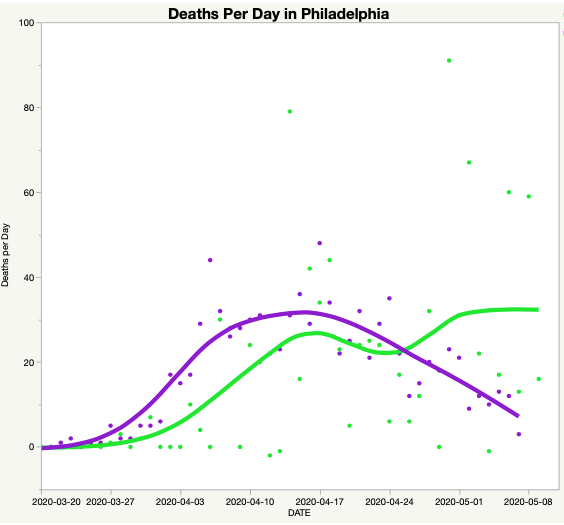Not a time for politics or bad data

Philadelphia has been hard hit by COVID-19. Our governor has extended the lockdown into June. Required benchmarks for re-opening are unlikely to be met soon.
What would you think about the decision to take an opposite approach made by a city, similar to Philadelphia in population and within driving distance, with approximately the same rate of infection and deaths and with similar trends? Unlike Philly, which is in a complete lockdown, this city’s elementary and middle schools were scheduled to reopen this month. Its local government officials encouraged teachers not to worry about returning to work since “complications from the virus are rare among healthy people under 70.”
You might think “this is a crazy and dangerous decision!” You might think it was made by an anti-science Red State public official more concerned about the economy than the risk of massively increasing the chances of a second wave of infection and death. Surprise! The city is Montreal, Canada.
It is likely that your opinion on Montreal’s decision is influenced mostly by your politics. No matter which side of this debate you’re on, if you think that the science is only on your side, you’re wrong. The basic fact is that there is far too much uncertainty and too many unknowns to scientifically determine the best decision.
Prediction models in use today are not accurate. The various factors that determine the virus’s spread interact with each other and are hard to measure, so we can’t forecast with accuracy and confidence. There are also competing values involved. On the one hand, we want to minimize illness and deaths. On the other hand, we want to prevent economic collapse.
Since there is no scientifically correct way to determine the right time to open, the tone of the debate is hampered by partisan bickering. Democratic governors are largely continuing strict lockdowns of their states, at least until case counts are low and widespread testing is available. Many Republican governors, encouraged by President Trump, are opening up their states, asking the public to decide individually how far to venture, hoping that any resurgence of the virus can be successfully countered.
In the U.S., extreme partisan politics leads to arguments even over basic facts. Republican-led states that have opened like Texas, Georgia, and Florida have seen downward trends. Democrats see upward trends and claim that it is too early to reopen. Can a trend be both up and down at the same time? Here is an example.
According to widely used data from the Pennsylvania Department of Health, the death rate in Philly is still trending upwards (green trend). On the other hand, data from the city itself has a very different assessment for what is supposed to be the exact same thing. The city data, which has the same number of total deaths, shows a steady increase, followed by a leveling off and then a steady descent (purple trend). The interpretation of the state health department’s data suggests that the epidemic is far from controlled, while the data from the city itself is saying just the opposite.

This difference is important. For those who support the continuation of the lockdown, the trend suggests that the first phase of the epidemic in Philadelphia is far from over. If you are looking to reopen you can find support in the data from the city.
Which is right? If this were Canada, experts would be called to make a judgment which the people would trust. Here in America, it’s just another contentious political debate.
It turns out the data from the city is actually more accurate; experts have audited the results and carefully matched deaths to the date on which they occur not when they were reported. The death rates have truly dropped substantially, which significantly strengthens the case for relaxing the lockdown in Philadelphia.
What we need to do across the U.S. is improve our data collection. We need richer and more accurate data on testing and death. This will not rid ourselves of politics entirely, but if everyone is working with the same data, it will make it easier to develop a plan that we can trust. Only then will we start feeling more confident about our government’s choices during these most uncertain times.
Abraham Wyner, PhD, is a tenured professor of statistics and chair of the undergraduate program in statistics at the Wharton School of the University of Pennsylvania. Dr. Wyner is also an associate fellow at the Center for Injury Research and Prevention (CIRP) at Children’s Hospital of Philadelphia, and Faculty Lead at the Wharton Sports Analytics and Business Initiative (WSABI), Co-Host of “Wharton Moneyball” on Sirius XM, and Founder of the Wharton Moneyball Academy.
Copyright 2023 Nexstar Media Inc. All rights reserved. This material may not be published, broadcast, rewritten, or redistributed.


